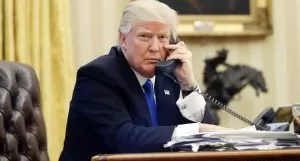White House: Trump Allows Two Weeks for Diplomacy Before Deciding on U.S. Strike Against Iran

Washington, D.C. – In a significant development amid escalating tensions in the Middle East, the White House announced today, June 19, 2025, that President Donald Trump has given a two-week window for diplomatic efforts to address ongoing concerns with Iran before making a decision on potential U.S. military action. The statement comes as the administration grapples with Iran’s nuclear ambitions and its role in regional conflicts, signaling a critical juncture in U.S.-Iran relations.
According to White House officials, President Trump’s decision to prioritize diplomacy for the next two weeks reflects a desire to explore non-military solutions to de-escalate tensions with Tehran. The move follows months of heightened rhetoric and incidents in the region, including Iran’s reported advancements in its nuclear program and alleged support for proxy groups targeting U.S. interests and allies, particularly Israel. While the administration has not ruled out a military strike, the two-week period is intended to allow for negotiations, potentially involving international partners, to address key issues such as Iran’s compliance with nuclear agreements and its regional activities.
“The President is committed to ensuring the safety and security of the United States and our allies,” said a White House spokesperson during a press briefing on Thursday. “He has authorized a two-week period to pursue diplomatic channels to resolve the situation with Iran. However, all options remain on the table, and the President will make a decision based on what best protects American interests.”
The announcement follows a series of high-level meetings at the White House involving top national security advisors, Pentagon officials, and members of the State Department. Sources familiar with the discussions indicate that the U.S. is engaging with allies, including European nations and Israel, to build a coordinated approach to pressure Iran into compliance with international agreements, particularly the 2015 Joint Comprehensive Plan of Action (JCPOA) or a new framework to curb its nuclear capabilities.
Iran, for its part, has repeatedly denied pursuing nuclear weapons, insisting that its nuclear program is for civilian purposes. However, recent reports from the International Atomic Energy Agency (IAEA) have raised concerns about Iran’s enrichment activities, which some analysts claim are approaching levels that could enable the production of a nuclear weapon. These developments have fueled calls for a stronger U.S. response, particularly from hawkish lawmakers and allies like Israel, which has long viewed Iran as an existential threat.
The two-week diplomatic window is seen as a critical test for both the Trump administration and Iran. Diplomatic efforts are expected to involve backchannel communications, potentially mediated by third parties such as Oman or Switzerland, which have historically facilitated U.S.-Iran talks. The U.S. is also likely to push for stronger sanctions enforcement and international pressure to bring Iran to the negotiating table.
However, the prospect of a U.S. military strike looms large if diplomacy fails. President Trump, who campaigned on a platform of strength and decisiveness, has previously signaled a willingness to use military force to counter Iran’s actions. In 2020, his administration ordered the targeted killing of Iranian General Qassem Soleimani, a move that brought the two nations to the brink of war. Analysts warn that any military action now could have far-reaching consequences, including retaliatory attacks by Iran-backed militias, disruptions to global oil supplies, and further destabilization of the Middle East.
Public reaction to the White House’s announcement has been mixed. Some lawmakers, particularly from the Republican Party, have expressed support for Trump’s approach, arguing that a clear deadline underscores the seriousness of the situation while giving diplomacy a chance. “The President is showing strength by keeping all options open while giving Iran an opportunity to back down,” said Senator Tom Cotton (R-Arkansas), a vocal critic of Iran’s government.
Others, including Democratic leaders and anti-war advocates, have urged caution, warning against the risks of escalation. “We cannot afford another war in the Middle East,” said House Speaker Nancy Pelosi (D-California) in a statement. “Diplomacy must be given every chance to succeed, and the administration must work closely with Congress and our allies to avoid a catastrophic conflict.”
As the two-week deadline approaches, the international community will be closely watching the U.S. and Iran for signs of progress or further escalation. The outcome of this period could shape the trajectory of U.S. foreign policy in the region and determine whether the long-standing tensions with Iran can be resolved through dialogue or will spiral into confrontation.
For now, the White House has emphasized that President Trump’s focus remains on protecting U.S. interests while seeking a peaceful resolution. “The President hopes Iran will choose the path of cooperation,” the White House spokesperson concluded. “But he is prepared to act decisively if necessary.”
The world now waits to see whether diplomacy can prevail or if the specter of military action will dominate the next chapter in U.S.-Iran relations.







